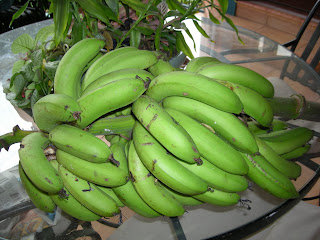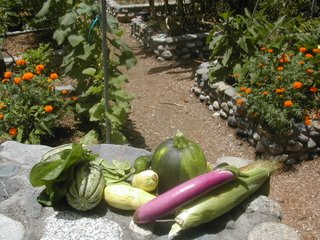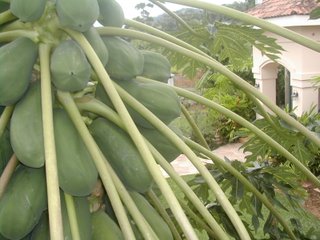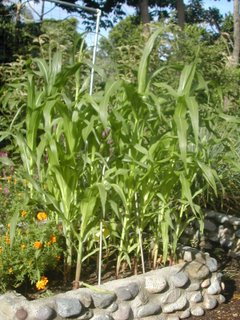 La Gringa's banana harvest
La Gringa's banana harvestGentle readers,
LG needs your help. I would really like to get a conversation going on this topic: Will poor people grow vegetables? Of course I know that some poor people grow vegetables for themselves or for sale. What I am asking is whether teaching the very poor in Honduras (or other Central American countries) to grow and eat vegetables is a viable and sustainable means of improving the health of their children? Will they have the means to garden? Will they continue after the first crop? Will they learn to cook and eat healthier?
 The email below is one of many I have received on this subject over the years. I told Danise that I just don't know the answer to her questions. To those people who have written, I've given some gardening advice, and pushed organics and composting since I know that the poor are not likely to be able to afford fertilizers and chemicals. Only one person has ever written back to give me an update and I really don't know if his project has been successful or continued over the years.
The email below is one of many I have received on this subject over the years. I told Danise that I just don't know the answer to her questions. To those people who have written, I've given some gardening advice, and pushed organics and composting since I know that the poor are not likely to be able to afford fertilizers and chemicals. Only one person has ever written back to give me an update and I really don't know if his project has been successful or continued over the years.
I frankly have my doubts, mainly because vegetables just aren't a big part of the diet in Honduras, except for bananas, platanos, yuca, and cabbage. Though unhealthy north American fast food has become very popular, healthier foods have not. Even restaurants often will have no vegetables other than the ones mentioned above.
 Even backyard crops have to be protected from thieves and wandering chickens, pigs, and cows. The soil is poor in many areas. During the dry season, access to water may be difficult to impossible for some. During the rainy season, crops can be lost in heavy rains. Access to composting materials is abundant, but may be beyond the reach of someone with no way to transport more than a bucketful of materials at a time. They very poor may not be able to buy seeds, a shovel or gardening fork.
Even backyard crops have to be protected from thieves and wandering chickens, pigs, and cows. The soil is poor in many areas. During the dry season, access to water may be difficult to impossible for some. During the rainy season, crops can be lost in heavy rains. Access to composting materials is abundant, but may be beyond the reach of someone with no way to transport more than a bucketful of materials at a time. They very poor may not be able to buy seeds, a shovel or gardening fork.
 One couple in Panamá, who tried with no success, decided that teaching gardening was actually starting in the middle of the process. After discussing the project with elementary school principals, they concluded that first children must learn the 'why' of eating vegetables, then learn 'how' to prepare vegetables so that they taste good, and then finally learn the 'how' of gardening. The principals disappointingly projected that it would take two to three generations before any change in the culture would take place.
One couple in Panamá, who tried with no success, decided that teaching gardening was actually starting in the middle of the process. After discussing the project with elementary school principals, they concluded that first children must learn the 'why' of eating vegetables, then learn 'how' to prepare vegetables so that they taste good, and then finally learn the 'how' of gardening. The principals disappointingly projected that it would take two to three generations before any change in the culture would take place.
On the other hand, gardening can be an enjoyable and rewarding pastime. Learning to do something new and productive is always beneficial and good for self-esteem. Time is an asset that many unemployed or underemployed people have, especially housewives who can also enlist the help of their children in the garden, which can be a wonderful learning experience for them, in addition to improving their health.
Here is the email:
If you have any experience or can give some insight, please let us know by either leaving a comment or writing to me privately (click "Contact" underneath the Blogicito title or click "Email the author" if you are reading from the daily Feedburner email). Any names, organizations, or email addresses will remain private with me unless you give permission for me to pass the information on to Danise.
I'll summarize what I hear back (if I do) and report it in another blog article so maybe others will be helped as well. Any help you can give will be greatly appreciated.
LG needs your help. I would really like to get a conversation going on this topic: Will poor people grow vegetables? Of course I know that some poor people grow vegetables for themselves or for sale. What I am asking is whether teaching the very poor in Honduras (or other Central American countries) to grow and eat vegetables is a viable and sustainable means of improving the health of their children? Will they have the means to garden? Will they continue after the first crop? Will they learn to cook and eat healthier?
 The email below is one of many I have received on this subject over the years. I told Danise that I just don't know the answer to her questions. To those people who have written, I've given some gardening advice, and pushed organics and composting since I know that the poor are not likely to be able to afford fertilizers and chemicals. Only one person has ever written back to give me an update and I really don't know if his project has been successful or continued over the years.
The email below is one of many I have received on this subject over the years. I told Danise that I just don't know the answer to her questions. To those people who have written, I've given some gardening advice, and pushed organics and composting since I know that the poor are not likely to be able to afford fertilizers and chemicals. Only one person has ever written back to give me an update and I really don't know if his project has been successful or continued over the years.I frankly have my doubts, mainly because vegetables just aren't a big part of the diet in Honduras, except for bananas, platanos, yuca, and cabbage. Though unhealthy north American fast food has become very popular, healthier foods have not. Even restaurants often will have no vegetables other than the ones mentioned above.
 Even backyard crops have to be protected from thieves and wandering chickens, pigs, and cows. The soil is poor in many areas. During the dry season, access to water may be difficult to impossible for some. During the rainy season, crops can be lost in heavy rains. Access to composting materials is abundant, but may be beyond the reach of someone with no way to transport more than a bucketful of materials at a time. They very poor may not be able to buy seeds, a shovel or gardening fork.
Even backyard crops have to be protected from thieves and wandering chickens, pigs, and cows. The soil is poor in many areas. During the dry season, access to water may be difficult to impossible for some. During the rainy season, crops can be lost in heavy rains. Access to composting materials is abundant, but may be beyond the reach of someone with no way to transport more than a bucketful of materials at a time. They very poor may not be able to buy seeds, a shovel or gardening fork. One couple in Panamá, who tried with no success, decided that teaching gardening was actually starting in the middle of the process. After discussing the project with elementary school principals, they concluded that first children must learn the 'why' of eating vegetables, then learn 'how' to prepare vegetables so that they taste good, and then finally learn the 'how' of gardening. The principals disappointingly projected that it would take two to three generations before any change in the culture would take place.
One couple in Panamá, who tried with no success, decided that teaching gardening was actually starting in the middle of the process. After discussing the project with elementary school principals, they concluded that first children must learn the 'why' of eating vegetables, then learn 'how' to prepare vegetables so that they taste good, and then finally learn the 'how' of gardening. The principals disappointingly projected that it would take two to three generations before any change in the culture would take place.On the other hand, gardening can be an enjoyable and rewarding pastime. Learning to do something new and productive is always beneficial and good for self-esteem. Time is an asset that many unemployed or underemployed people have, especially housewives who can also enlist the help of their children in the garden, which can be a wonderful learning experience for them, in addition to improving their health.
Here is the email:
My name is Danise. I came across your site doing some research. I have been working with a ministry in Honduras for about 3 years now and just came home a couple of days ago from my last trip. So the names of the towns, etc. caught my eye instantly when I read a few of your blogs. I fly into San Pedro Sula each time and then have a drive to the mountains where we stay.
The people are of course very poor and malnourished and we do many things to help them from clothes, soaps, toothbrushes and other donations. The last time I had a doctor and nurse with my team and we set up a clinic to provide some much needed health care for these people. Hundreds of people walked to see the doctor and we treated everything from lice, and scabies to pneumonia and starvation.
One mother carried her baby over an hour one way in the hot sun. This baby at four months old had only been feed the water drained off the rice the mother prepared for her other children once a day. So saving this little one's life was where we started, providing formula for the baby and food for the family, along with continued support for them. But this is just one family of many facing the same situation.
So one of my main concerns is that these families are so poor and do not have a way to provide even basic food for themselves. I saw you had gardening as an interest and that is one thing I am trying to do research on. For example what crops may grow, what seeds would be beneficial etc.
I know the altitude, climate and conditions are so very different that where I currently live in Michigan. But my next trip is scheduled to return in June to Honduras and if there was any way I could provide seeds, or train these families to grow even something simple it really is a step in the right direction. Do you have any advice, information or thoughts on what direction I could head with this idea?
I also know that the mountains and the coast are going to vary but I thought if you had any suggestions it was a place to start. Thanks for your time Sincerely,
Danise
If you have any experience or can give some insight, please let us know by either leaving a comment or writing to me privately (click "Contact" underneath the Blogicito title or click "Email the author" if you are reading from the daily Feedburner email). Any names, organizations, or email addresses will remain private with me unless you give permission for me to pass the information on to Danise.
I'll summarize what I hear back (if I do) and report it in another blog article so maybe others will be helped as well. Any help you can give will be greatly appreciated.




 Welcome to my Blogicito —
Welcome to my Blogicito — 







